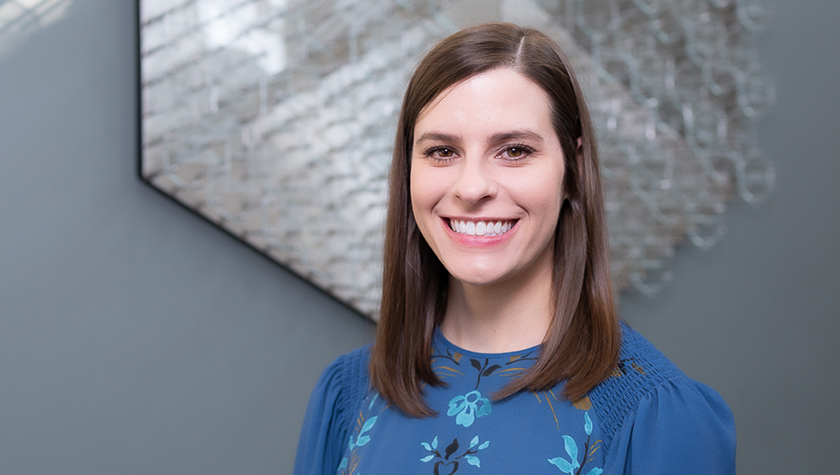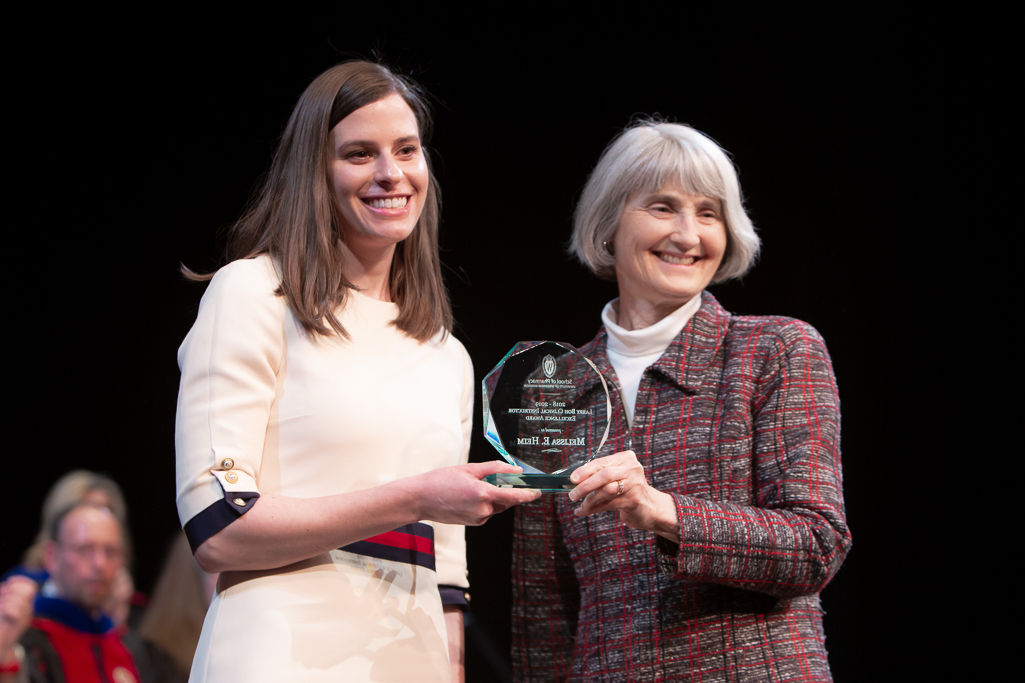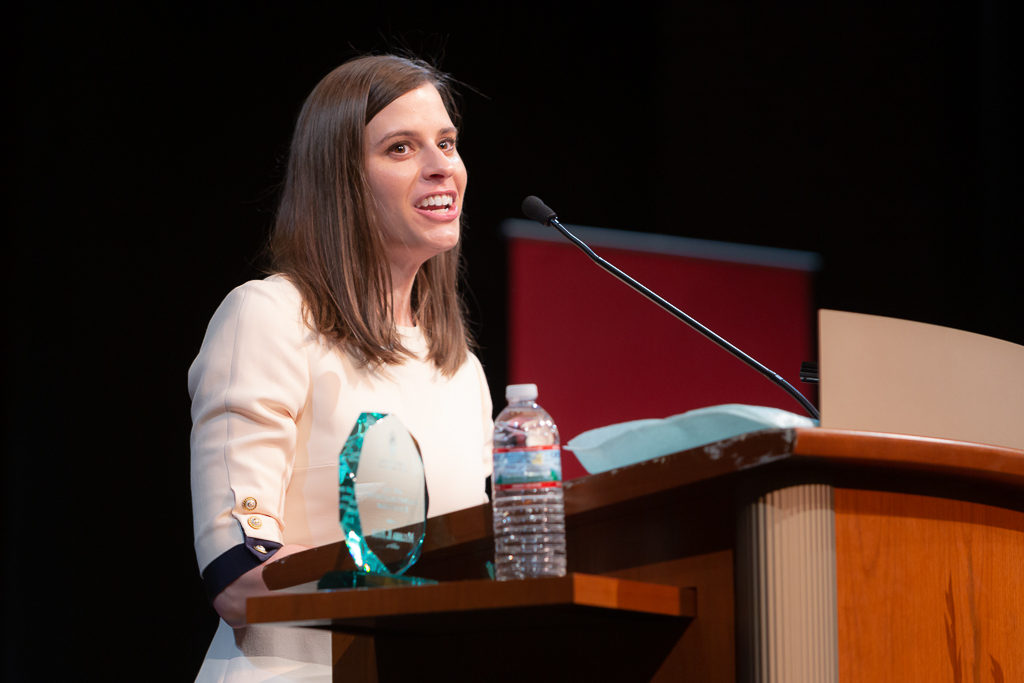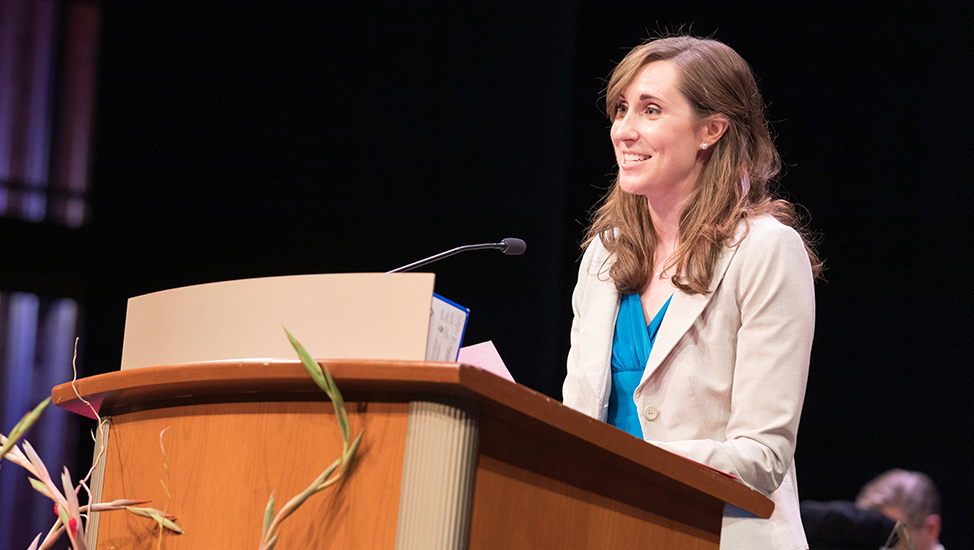
A School of Pharmacy alum and preceptor, Ha (PharmD ’12) embodies clinical instructor excellence
By Katie Ginder-Vogel
As a student pharmacist at the University of Wisconsin–Madison School of Pharmacy, Melissa Ha (PharmD ’12) had career-shaping clinical rotations. And she credits that to her preceptors.
“During pharmacy school, my fourth-year rotations, and residency, I had exceptional preceptors — Paul Lata (PharmD ’01), Jeff Fish (BS ’91, PharmD ’93), and Karen Kopacek — who got me involved in patient care, made me feel like a valued member of the team, and got me thinking critically,” says Ha. “I’m grateful for their patience, kindness, and effort.”
Today, as a critical care clinical specialty pharmacy specialist at the William S. Middleton Memorial Veterans Hospital in Madison, Wis., she pays it forward and has so far skillfully precepted more than 100 pharmacy residents and students. In 2018, she was named the William S. Middleton Memorial Veterans Hospital Pharmacy Residency Preceptor of the Year, and in 2019, she received the Larry Boh Clinical Instructor Excellence Award from the School of Pharmacy.
“Seeing students learn and develop is the reason I’m a preceptor, and it makes me passionate about continuing in this role.”
—Melissa Ha
Now, her precepting is drawing national attention: She is being honored as a 2023 American Association of Colleges of Pharmacy (AACP) Distinguished Preceptor, in recognition of her dedication and commitment to excellence in experiential education and professional practice. Last year, alum Kate Hartkopf (PharmD ‘08) earned the recognition.
“I’m extremely honored and humbled,” says Ha. “This award isn’t about me; it’s about the work everyone at the School of Pharmacy has put in to make the learning environment the best it can be. It’s about the VA supporting teaching endeavors at the highest level and the administrative support staff who set up rotations to be successful. This is an award for everybody.”
A passion for teaching
Lata was Ha’s preceptor during her fourth-year rotation at the William S. Middleton Memorial Veterans Hospital. He introduced her to Fish, a clinical pharmacy specialist and PGY-2 critical care residency preceptor at UW Hospital & Clinics, who received the AACP Distinguished Preceptor award in 2017.

“Paul Lata always does the right thing for patients, no matter how busy things are,” says Ha. “I met Jeff Fish and ran project ideas past him, and he shared his knowledge and expertise with me — someone who wasn’t even his student and was from another site,” says Ha. “I was so grateful to learn from Jeff, and I planned my PGY-1 residency at UW Hospital so I could do my PGY-2 residency with him. He still teaches me to this day.”
Associate Dean for Student Affairs Karen Kopacek, associate professor in the School’s Pharmacy Practice and Translational Research Division, is another of Ha’s longtime mentors.
“I’m really grateful for the time and opportunities she’s given me over the years,” Ha says. “I know I would not have ended up where I did without my preceptors, and I hope to have those same kinds of transformative impacts on pharmacy students and residents.”
Pristine precepting approach
Ha’s preceptors instilled such reverence for precepting in her that even as a student, she took other students and residents under her wing. After she graduated, she completed a teaching certificate at the School of Pharmacy as a resident and became an official preceptor. When she interviewed for her current job at the Madison VA, she made sure to ask whether she would have the opportunity to precept pharmacy students and residents.
“I view precepting as a way to give back — training the next generation of pharmacists,” she says.

Ha has also helped coordinate Seminars in Critical Care, an elective course at the School of Pharmacy she helped to develop with Fish, since 2014.
“I enjoy teaching students,” Ha says. “When I can teach a student, and by the end of their rotation, they can improve patient care while taking care of our nation’s veterans, the reward is priceless. Seeing students learn and develop is the reason I’m a preceptor, and it makes me passionate about continuing in this role.”
Ha’s approach to precepting is to serve as a role model for her students and residents and to demonstrate her interest in them as people and pharmacists. She follows the four stages of precepting as outlined by the American Society of Health-System Pharmacists: direct instruction, modeling, coaching, and facilitating independence.
She explains the four-stage model to them at the start of their rotations and refers back to it throughout. For example, if she’s providing direct instruction on a disease state, she’ll call the doctor to make a clinical intervention, modeling that action for the student. The next time a need for a clinical intervention arises, Ha will practice making the phone call with the student, coaching them through the process, and then have the student make the call independently, with Ha on the line for support.
“It’s exciting to see them want to move on to the next stages,” Ha says. “I work hard to make sure students are an integral part of the healthcare team, taking care of patients, going on rounds, providing recommendations to critical care doctors, and documenting those interventions. Learners want to improve patient care, so I involve them in the quality improvement projects I’m working on and bring them to everything.”
Strong connections
Ha loves mentoring the student pharmacists and residents who often become her colleagues.
“It is incredible,” she says. “That’s the goal, and it feels priceless. Witnessing their journey is why we do this work. I tell them I want to teach them what I can and how to learn, and my goal is for them to someday teach me to become an even better preceptor.”
She also values the connection she maintains with the School of Pharmacy.
“This award honors the work everyone puts in and the time they put into teaching me. I wouldn’t be able to teach without everyone else.”
—Melissa Ha
“The UW–Madison School of Pharmacy is beyond comparison,” Ha says. “They work tirelessly to set up rotations to be successful and to tell preceptors what changes are coming, teaching us to be better preceptors, and develop our own skills through continual training.”
Now, as she’s joined the elite ranks of nationally recognized preceptors, she credits her colleagues at the William S. Middleton Memorial Veterans Hospital, the School, and her former preceptors and mentors.
“This award honors the work everyone puts in and the time they put into teaching me,” she says. “I wouldn’t be able to teach without everyone else.”
